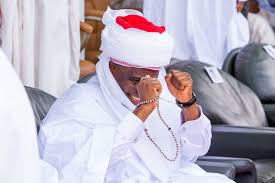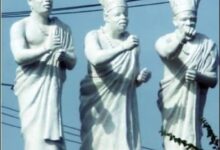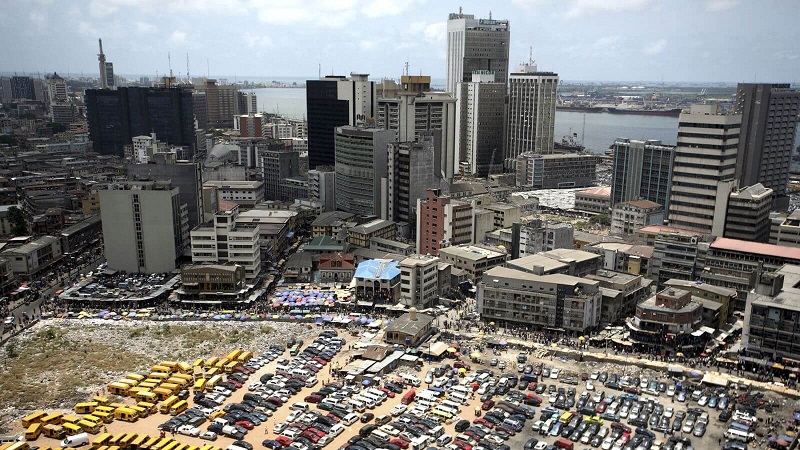Why Islam is different in Yorubaland and Hausaland
By FAROOQ KPEROGI
Popular narratives about Nigeria, particularly in the West, routinely dichotomize the country into a “Muslim North” and a “Christian South”. But this dichotomization elides many subtleties, such as the fact that Muslims enjoy a numerical dominion in Yorubaland in southwestern Nigeria and that Christians predominate in many northcentral states and in the northeastern state of Taraba. This piece looks at Islam in Yorubaland and how it differs from Islam in Hausaland.
It is a little known fact that Yoruba and Hausa people share a common, age-old Muslim heritage even though the manifestation of Islam in the lived experiences of the people is fundamentally different, and this is magnified by the often acrimonious political differences between the two groups in contemporary Nigeria. The emergence of Islam in both societies is not only fairly coextensive, it is also from the same source. So, why are expressions of Islamic religiosity markedly different in the two groups? But, first, when and how did Islam come to these polities?
Although historians have not agreed on when to place the incipience of Islam in Hausaland and Yorubaland, there is wide consensus that Islam was first introduced in Kano (and in much of Hausaland in Nigeria’s northwest) in a systematic form in the 1300s when Yaji I was king of Kano— and in Yorubaland in the 1450s during the reign of Oluaso, the defunct Oyo Empire’s longest reigning monarch on record.
Tarikh arbab hadha al-balad al-musamma Kano, the Arabic-language palace diary known to us in English as the Kano Chronicle, which recorded biographical profiles of Kano’s kings from the 10th century until the Usman Dan Fodio jihad in the early 1800s, is the first known written account to state that Islam was brought to Kano by the Wangara people of Mali during the reign of Yaji I who ruled from 1349 to 1385.
Islam also came to Yoruba land (and surrounding areas such as Borgu and Nupeland) through the same Wangara people of Mali, which explains why Islam is called “Esin imale” in the Yoruba language, which literally means “religion of Mali”. Many Arabic words in the Yoruba language, , including in the Ifa corpus, came to Yoruba by way of Songhai, the language Malians spoke when they arrived in Yorubaland. Note that the Wangara of Mali are also known by names including Mande, Mandinka, Malinke, Mandingo, Dyula, Bambara, Soninke.
(It’s also important to note that traces of Islam had existed in Hausaland, Yorubaland, and other places much earlier than is noted here, primarily through the Trans-Saharan trade, which lasted from about the 8th century to the 16th century. The trade saw Arab traders travel from Arabia through North Africa to parts of West Africa in search of gold, salt, and slave labour. All communities on this route, which include Hausaland, Borgu, Nupeland, parts of Yorubaland, the Gambia, Senegal, Mauritania, Niger, Mali, etc. are historically Muslim.)
Although Islam has existed in Yorubaland since at least the 1400s, the first mosque wasn’t built in Oyo-Ile, the ancient capital of the Oyo Empire, until 1550, and in Iwo, a historic Yoruba Muslim town, until the 1600s. While Islam took sufficient root in Yorubaland that Sharia courts were established in some towns, traditional modes of Yoruba worship coexisted with Islam for centuries.
Former Bauchi State governor Isa Yuguda pointed out on 26 April 2013 that “the first Sharia court [in what is now Nigeria] was established in Iwo, in Osun State”. Many Yoruba Muslims repeat this claim both to show that Islam in Yorubaland has a historical edge over Islam in the North and to persuade the Nigerian government to allow the implementation of Sharia for Yoruba Muslims who desire it.
But the claim is probably an exaggeration. Sharia courts seem to have existed in Hausaland before they appeared in Iwo, but their appearance in Yorubaland obviously did precede colonialism by at least 100 years. Other Yoruba towns that had Sharia courts decades before colonialism are Epe, Ikinrun, and Ede, which are all located in what is now Osun State.
As should be obvious by now, contrary to what most people have been predisposed to suppose, Islam in Yorubaland predates Usman Dan Fodio’s 1804 jihad by many centuries. Of course, this is true not just of Yorubaland, but also of many places in Nigeria, including Hausaland, Borgu, Nupeland, etc. In any case, the Usman Dan Fodio jihad did not, nor was it designed to, introduce Islam to any part of Nigeria; it only sought to “reform” it where it already existed.
If the Jihad’s goal were to convert non-Muslims to Islam, Zuru, a predominantly Christian community in what is now Kebbi State, would be religiously indistinguishable from Sokoto or Gwandu, the Sokoto Caliphate’s second most important town. In fact, it was against the interest of the Fulani jihadists for non-Muslims to convert to Islam because they used non-Muslims as slaves. Since Islam forbids the enslavement of fellow Muslims, it wasn’t in the interest on the jihadists for surrounding non-Muslim areas to be converted to Islam since it would stop the source of cheap slave labour.
So, Islam in Yorubaland and Islam in Nigeria’s extreme north share similar Malian-inflected historical trajectories, and none is a direct consequence of the other, although there are interesting historical overlaps between them. For instance, several Hausa (and pre-Dan Fodio jihad Fulani) Muslim scholars travelled to Yorubaland to preach and share Islamic knowledge and inspired a robust linguistic and cultural interchange between the two groups.
Yoruba, jihad, and a new Hausa identity
Prior to Usman Dan Fodio’s 1804 jihad, Islamic practices in both Hausaland and Yorubaland were similar in their syncretism. That is, they fused traditional African religions and Islam. In his book Imale: Yoruba Participation in the Muslim Tradition. A Study of Clerical Piety, Patrick Ryan characterized Islamic practices in Yorubaland as “accommodationist” and pointed out that Usman Dan Fodio would have condemned Yoruba Muslims as “mixers”—as he did Hausa Muslims of the time.
So, Usman Dan Fodio’s jihad was the defining point of departure between Islam in Hausaland and Islam in Yorubaland. The jihad didn’t just extirpate the accommodationist, syncretic brand of Islam previously practised in Hausaland, it also laid the grounds for a new syncretic identity in Hausaland.
The jihad deposed Hausa kings, imposed Fulani rulers, and caused the cultural and ethnic melding of the Hausa and the Fulani people (whose languages are not only mutually unintelligible but also, in fact, belong to different language families) on a scale of intensity that is unexampled anywhere in Nigeria.
One of the byproducts of the ethnic and cultural alchemy of the Hausa and the Fulani is the emergence of Islam as the indispensable glue of a new ethno-religious identity that is now known as the “Hausa-Fulani” in Nigeria. The emergent Fulani ruling class intentionally merged with and became culturally and linguistically indistinguishable from the majority Hausa population and made Islam—which both groups shared in common—the fulcrum of the new identity.
Over the years, Islam has become not just a religion but an intrinsic constituent of an evolving, increasingly expansionist, politically consequential, and largely non-primordial Hausa Muslim identity. This fact has made Hausa the most ecumenical ethnic identity in Nigeria, by which I mean anybody can be “Hausa” provided they are Muslim, speak the Hausa language with native proficiency, dress like the Hausa, disavow allegiance to competing identities, and subscribe to the cultural consensus of the people.
An influential 1975 academic essay by Frank Salamone titled “Becoming Hausa: Ethnic Identity Change and its Implications for the Study of Ethnic Pluralism and Stratification” captures this phenomenon brilliantly. It shows how non-Hausa ethnic groups, such as the Gungawa and the Kamberi in what is now Kebbi State, converted to Islam and became Hausa. This speaks to how northern Muslim identity is becoming an ethnogenesis and why previously discrete ethnic identities are increasingly collapsing into Hausa.
Even Yoruba or Igbo people, who are ordinarily the fiercest competitors to the Hausa in contemporary Nigeria, can become “Hausa” if they are acculturated into the Hausa identity (that is, if they become Muslims, speak the Hausa language fluently and internalize the cultural consensus of the society). Two examples will suffice. The grandfather (some people say father) of Alhaji Abdulkareem Yahaya, the first civilian governor of the old Sokoto State (which encompassed present-day Sokoto, Kebbi, and Zamfara states) migrated to Gusau as a railway worker from Ogbomoso, a major Yoruba town in Oyo State. Most voters knew of his Yoruba ethnic origins but voted for him anyway because he was, and still is, culturally, linguistically, and religiously indistinguishable from anyone else in the state.
In 1992, a man born of an Igbo father (who converted to Islam) and a Hausa mother by the name of Aminu Inuwa almost became the governor of Kano State. He narrowly lost out in the Social Democratic Party (SDP) primary election to Magaji Abdullahi. But he was so beloved by the electorate in Kano, which was an SDP stronghold, that Kano people voted for the National Republican Convention’s Kabiru Gaya in protest against Inuwa’s primary loss. The Kano electorate later voted SDP in the presidential election, which military dictator Ibrahim Babangida cancelled on 12 June 1993. Inuwa’s Igbo paternal ancestry was common knowledge in Kano, but it didn’t matter because he was a Muslim who was also culturally and linguistically Hausa.
From 2007 to 2011, Ibrahim Shekarau, who is ethnically Babur from southern Borno where a good portion of the population is Christian, became governor of Kano State. Another Second Republic Kano State governor, Sabo Baki Zuwo, was not ethnically Hausa. His grandfather was Nupe, but it didn’t matter because he was a Muslim.
Yoruba, Islam and identity in Nigeria
Islam in Yorubaland, on the other hand, hasn’t evolved from the accommodationist character it previously shared with Islam in pre-jihad Hausaland. And because Islam has been caked into the Hausa ethnic identity and constituted as the most important building block for identity formation in Northern Nigeria so much so that “Hausa” and “Muslim” have become misleadingly synonymous in the Nigerian popular imagination, Yoruba Muslims have been compelled to privilege their ethnic identity both to fend off equivalence with, and to establish difference from, Hausa Muslims.
In other words, the association of Islam with Hausa – or Hausa-Fulani – is leading to its repudiation in even historically Muslim polities in southern Nigeria such as Yorubaland and northern Edo.
As John Paden noted in Ahmadu Bello Sardauna of Sokoto: Values and Leadership in Nigeria, Ahmadu Bello, Northern Nigeria’s first premier and great-great-grandson of Usman Dan Fodio, actively promoted Islam as Northern Nigeria’s official religion before and after independence. Professor Sakah Saidu Mahmud, in his 2004 essay for the African Studies Review titled “Islamism in West Africa: Nigeria” also pointed out that Islam in northern Nigeria emerged as “the source of identity and a medium of competition for resources and political power”.
He added that “The regional leaders were in competition with each other as they worked to consolidate their local powers, and Islamization was a means for promoting regional identity.” (It also caused dissension in the North and intensified the struggles for a separate “Middle Belt” region for northern Christians). This reality put Yoruba Muslims in western Nigeria on the spot. Openly identifying as Muslim risked inviting suspicion that they identified with the Muslim North, which instrumentalized Islam for identity and for competition with southern Nigeria, including Yorubaland.
Perhaps as a consequence of this, many Yoruba Muslims in pre- and post-independence Nigeria chose to conceal their Muslim names even when they were practising, believing Muslims, just to distinguish themselves from northern Muslims. For example, a prominent pre-independence Ibadan politician by the name of Adelabu Adegoke who was famous for his electrifying oratory changed his family name from Sanusi (which he bore throughout his educational career) to Adegoke.
Yoruba Muslims are also famous for their creative morphological domestication of Arabic names. As I showed in a 13 July 2014 column titled “Top 10 Yoruba Names You Never Guessed Were Arabic Names” there are scores of Yoruba names that are derived from Arabic but which are barely recognizable to Arabs or other African Muslims because they have taken on the structural features of the Yoruba language.
The fact that the Sultan of Sokoto, a scion of Usman Dan Fodio, is recognized in Nigeria as the permanent leader of Nigerian Muslims, whether or not the Sultan is knowledgeable in Islam, hasn’t helped the image of Islam in Yorubaland. This fact is giving Christianity, usually syncretic Christianity, an edge in the region lately. Interestingly, many of the most famous Christian clerics in Yoruba – such as Bishop David Oyedipo, Pastor Tunde Bakare, and the late Prophet T.B. Joshua – were born Muslim and converted to Christianity later in life.
Conclusion
Islam manifests differently in Yorubaland than in Hausaland because the religion didn’t outgrow its accommodationist origins in Yorubaland whereas the jihad of 1804 took that feature away from the Islam in Hausaland. The multi-ethnic character of Fulani-ruled Hausa society in the aftermath of the jihad also necessitated unity around common values, and Islam and the Hausa language became core instruments for this.
When colonialism emerged and disparate polities were forced into a Nigerian union by the British from the 1900s, northern Muslim leaders instrumentalized Islam for the mobilization of identity and political control, which put them at odds with Yoruba Muslims. The byproduct of that is a conscious deemphasis of the Islamic faith of Yoruba Muslims in favour of Yoruba ethnic solidarity. This reality is causing the progressive shrinking of Islam in Yorubaland – in addition to the influence of Christian evangelism, which started in the mid-nineteenth century.
For most Hausa Muslims, however, Islam isn’t just a faith; it’s also an encapsulation of the totality of their identity. That’s why they are more emotionally invested in it – and react forcefully when it is attacked, undermined, or ridiculed – than Yoruba Muslims are. And that’s why they feel more kinship with Muslims outside Nigeria than they do with their non-Muslim compatriots in Nigeria.
It should be noted that these are broad-brush characterizations that overlook exceptions. There is a minority of Yoruba Muslims, for instance, who have more allegiance to Islam than they do their ethnic identity. For instance, at a gathering of Yoruba Muslims in Akure on 19 June 2021, Sheikh Imran Molaasan, national president of Jama’at Ta’awunil Muslimeen and Iwo native, reportedly said, “If Nigeria breaks up, Yoruba Muslims will suffocate” in an Oduduwa republic, and even implied that the resentment against the Fulani in Yorubaland masks sneaky anti-Muslim designs by Yoruba leaders who are mostly Christians.
There is also a minority of Hausa ethnic nationalists who resent the dilution of their ethnicity with other ethnicities in the name of Islam, and there are Fulani nationalists who agonize over the progressive decline of their language, culture, and identity, but these groups are, for the most part, marginal.
*Farooq Kperogi is Professor of Communication at Kennesaw State University, USA, and a columnist for the Nigerian Tribune.








